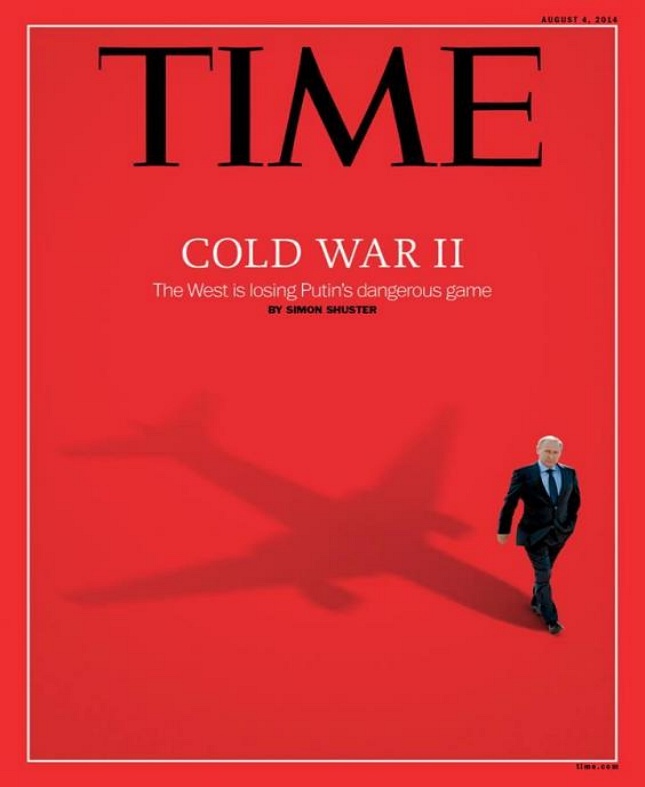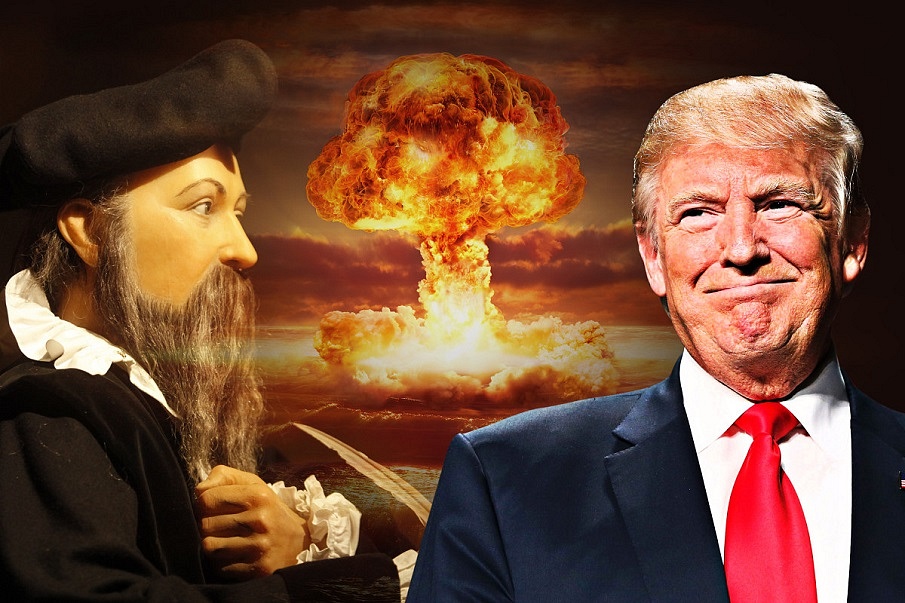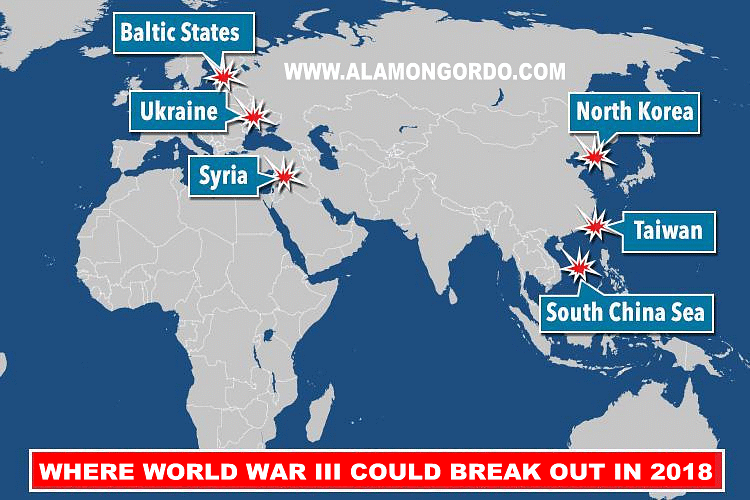WORLD WAR III IS COMING !
Although there has been no major combat between the great powers since the Second World War, there are three key fronts emerging that make the prospect of a third global conflict alarmingly conceivable.
The prospect of a global conflict – World War III if you like – appears somewhat unthinkable. Since the Second World War, there has been no major war between the great powers. The original post-war European project was based around peace, social justice and harmony. The unravelling of this project, accompanied by rising nationalism, is likely to exacerbate the dangers of war on a continent with a fraught history of bloody conflict.
In the 20th century, both world wars were unanticipated. Christopher Clark’s much acclaimed The Sleepwalkers: How Europe Went to War in 1914 – published in timely fashion for the centenary of First World War – charted Europe’s unexpected descent into war. First World War had been preceded by a prelude of serenity – the long 19th century of relative peace and stability. The great powers of Edwardian Europe had been engaged in diplomacy and trade prior to the onslaught of carnage.
During the 1930s, the major powers were keen to avert another war hence the policy of appeasement, the initial reluctance of the US to become involved and the Nazi-Soviet pact. Neville Chamberlain’s ill-fated announcement of “peace for our time” should be viewed in this context. Throughout the Cold War, the concept of a third world war was inextricably associated with nuclear war and the MAD doctrine of Mutual Assured Destruction.
Yet it is possible that future conflict between the great powers may take the form of another cold war or even a conventional (as opposed to thermonuclear) hot war. In the 21st century, there are three key fronts emerging as the loci for future wars. The first is the Europe-Russia front with a new cold war triggered by the Ukrainian conflict. The second is the Middle East cauldron centred around Isis and the Syrian war. The third is the Asia-Pacific front with a face-off between the United States and China.
Cold War II
Time magazine – the original Cold War mouthpiece of the American establishment – trumpeted the start of Cold War II in 2014. Western powers have characterised Vladimir Putin’s incursions into Georgia in 2008 and lately Ukraine as aggressive expansionism. Evidently the irony of the US casting aspersions around violation of national sovereignty, in light of the folly of the Iraq war, seems to have been lost. The realist perspective – as articulated by John Mearsheimer in the pages of US foreign policy bible Foreign Affairs – is that the Ukrainian crisis was preceded by two decades of NATO expansionism up to the borders of Russia. This was in contravention of promises made to respect these boundaries at the end of the Cold War.
In this view, events in Ukraine have merely been the endgame of this process. It is worth recalling that the United States did not respond amicably to Soviet interference in Cuba in the 1960s. Such arguments have been rendered somewhat academic as they are overtaken by events. Increasing deployments of troops by both Nato and Russia, dangerous confrontations and massive war games are being played out.
The European Leadership Network (ELN) think-tank produced a 2015 report entitled Preparing for the Worst: Are Russian and Nato Military Exercises Making War in Europe more Likely? The report analysed recent war games including a Russian exercise involving 80,000 military personnel and a set of Nato war games comprising 15,000 personnel.
It went on to say that, “Both exercises show that each side is training with the other side’s capabilities and most likely war plans in mind… Whilst spokespeople may maintain that these operations are targeted against hypothetical opponents, the nature and scale of them indicate otherwise. Russia is preparing for a conflict with Nato, and Nato is preparing for a possible confrontation with Russia.”
Recently, the US has stationed troops in Poland in the largest deployment of American troops in Europe since the end of the Cold War. As reported, these US troops will also, “fan out across other eastern European states, including Estonia, Bulgaria and Romania”. Russia alarmed the Baltic states by, “moving nuclear-capable Iskander-M missiles to its naval base at Kaliningrad in the autumn”.
According to the New York Times, an American missile shield is, “to be built in Poland mirroring one already in place in Romania”. Whether Trump’s attempted rapprochement with Russia defuses the situation remains to be seen. If the cold warriors in the Atlanticist defence establishment and hard-liners on the Russian side have their way, then tensions are only likely to be ratcheted up.
Middle East Geopolitics
The intrepid German author Jürgen Todenhöfer took the concept of embedded journalism to a whole new level by holing up with Isis. He points out that in the immediate aftermath of 9/11, there were only a few hundred Islamist fighters in the Hindu Kush mountains. Fast forward through 16 years of the war on terror costing some $4,000bn (£3,300bn) and leaving 1.3 million dead, according to Physicians for Social Responsibility, and the number of terrorists is currently about 100,000. Even on its own terms, the war on terror has been an abysmal failure. How on earth did this happen? Retired US General Wesley Clark revealed that, in the wake of 9/11, the Pentagon drew up plans to attack 7 countries.
These plans have been adhered to with remarkable fidelity with Western involvement in Iraq, Syria, Libya, Afghanistan, Pakistan, Somalia and Yemen. The pretext may have been terrorism but the intention was to guarantee economic and military supremacy in the region. Many critics argued that the Iraq war was fundamentally about the opening up of state assets to global capital. Naomi Klein reported that the reconstruction of Iraq was estimated to have been worth about $100bn to the US economy. In the process, Iraq was transformed from a secular dictatorship into a Jihadist safe haven. Donald Rumsfeld’s decision to disband Saddam Hussein’s Baathist army led to chaos and now makes up a significant component of Isis.
The deliberate stoking of tensions through a US sponsored sectarian Shia-led Iraqi government was notable. This ultimately led to the Sunni backlash and the spawning of al-Qaeda in Iraq. This is a hallmark of colonial-era tactics of divide and rule. In fact, British and American intelligence predicted that the Iraq war would lead to the amplification of Islamist terrorism.
Back in 2007, the veteran investigative journalist Seymour Hersh posited in an extended New Yorker essay, The Redirection, that US Middle East geopolitical strategy was directed against the regional superpower of Iran and its Shia sphere of influence extending through Syria and to Hezbollah in Lebanon. Hersh has since elaborated, in a series of controversial London Review of Books essays, that the overthrow of Bashar al-Assad would have severed this Shia sphere. Following the destruction of Iraq, this sphere remained the only obstacle to US full-spectrum dominance of the world’s largest oil fields.
The Syrian war has seen allies – Saudi Arabia, Qatar and Turkey – arming and funding radical Jihadist groups, such as the al-Nusra front. Former Vice President Joe Biden – renowned for bloopers – frankly admitted as much to a Harvard audience. The Wikileaks disclosures of Hillary Clinton’s emails revealed that she too was aware of Saudi and Qatari governments arming Isis. In realpolitik, the ends apparently justify the means.
Hersh elaborates on how British and American intelligence have been enmeshed with the use of CIA front companies in an arms pipeline from Libya to Syria dubbed the “rat line”. It was under these conditions that the mutation into the Frankenstein monster that is Isis took place. In fact, a 2012 Defence Intelligence Agency memo had anticipated the rise of Isis and its establishment in Syria in order to “isolate the Syrian regime, which is considered the strategic depth of the Shia expansion”.
The terrorist attacks in Europe have demonstrated the difficulty in containing the spill-over from these policies. The Syrian war has seen the return of great-power politics with the involvement of Russia. This contamination has the potential for a wider conflict in which western countries could be drawn in. One possible trajectory is that a Sunni-Shia war along the Saudi-Iran axis looks increasingly likely. Yet this destabilisation of Iraq and Syria may well have been engineered deliberately.
According to Nafeez Ahmed, documents from the Rand Corporation and US private intelligence firm Stratfor confirm this picture. An incendiary report, authored by no less than former Bush Vice President Dick Cheney and former deputy Defence Secretary Paul Wolfowitz, envisioned ethno-sectarian partitioning of Iraq. All in all, this could represent a new Sykes-Picot (the post Ottoman empire settlement) or redrawing of the Middle East carving it up into smaller, weaker territories, which are more pliable.
Back in the 1990s, the political scientist Samuel Huntington made some dire predictions of a clash of civilisations. Even in the wake of 9/11, such apocalyptic theories appeared quaint; now they no longer seem absurd. Isis directives aim to create more violence and chaos with the obliteration of the “grey zone” of multicultural societies, in which non-Muslims and Muslims live side by side, forcing Muslims to join the “caliphate”. Ironically, US policy is doing Isis’s work for them and, in another bizarre twist, it seems that Isis is aiding US geopolitical strategy.
Asia Pacific
Ghost Fleet: A Novel of the Next World War is an intelligent thriller written by PW Singer and August Cole, both of whom have national security expertise. Ghost Fleet imagines what a 21st century world war might look like pitting the US, China and Russia against each other complete with cyber-warfare, robotics and drones. But could this nightmarish fiction turn into dystopian reality?
During the Obama administration, the Pentagon pursued the pivot to Asia aiming to transfer 60 per cent of naval bases to Asia. The US also strengthened alliances with Japan and other Far East partners to “contain” China. Economically, the US pursued the Trans-Pacific Partnership (TPP) – a massive trade agreement, which would have deliberately excluded China. Admittedly, a Trump executive order indicates imminent withdrawal from TPP. In recent years, tensions have been mounting between China and Japan.
Both sides are now equipped with vertical take-off aircraft. There have also been a series of stand-offs between the US and China in the South China Sea. The US is currently installing a missile defence system in South Korea prompting China to warn of a new atomic arms race in the region. A recent US taskforce report unsurprisingly concluded that America and China are on a dangerous collision course.
The Trump transition is likely to exacerbate US-China tensions. Trump has threatened a trade war with China. While his chief strategist Steve Bannon stated in March of last year that, “We’re going to war in the South China Sea in five to 10 years…. There’s no doubt about that.” If there is a coherent philosophy of Trumpism then it is represented by the ideology of Bannon. Bannon subscribes to the Huntingtonian idea of a coming clash of civilisations between west and east with the Orient bracketing both China and Islam.
Bannon views China and Islam as expansionist threats. He has also stated that the Judaeo-Christian west is, “at the beginning stages of a global war against Islamic fascism” and that, “We’re clearly going into, I think, a major shooting war in the Middle East again.” China will eventually overtake the US in economic terms but US supreme military dominance is unchallenged. This is a dangerous discrepancy as it means that the US will use this military power to guarantee its economic prerogative – particularly as a massive national security apparatus now seems to dictate US foreign policy. As Obama has put it, the US is exceptional because it acts.
This would be in keeping with the default operational mode of capitalism. One might even argue that capitalism often resolves systemic economic crises through war. After all, a war economy with militarisation, mobilisation, full employment and jingoism can be viewed as the ultimate solution to economic woes and social unrest.
The transition of Western democracy to oligarchy and the descent into soft fascism is under way. Citizens will need to participate actively, rather than as passive consumers, to demand an end to this cycle of violence from governments and to defend the assault on democratic processes. We can only hope that British foreign secretary Sir Edward Grey’s refrain on the commencement of First World War – “The lamps are going out all over Europe, we shall not see them lit again in our life-time” – will not be repeated in ours. But the omens are not good. As the late Eric Hobsbawm put it, the old century has not ended well.
Source : Independent



